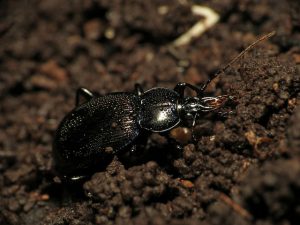Conservation ag increases beneficial biodiversity, supports weed control
 Photo credit: Katja Schulz
Photo credit: Katja Schulz
A recent study published in Agriculture, Ecosystems and Environment demonstrates that conservation management of farms increases the abundance of carabid beetles that consume the seeds of weeds in crop fields. Researchers examined 67 fields in California. They determined whether or not conservation agriculture practices were in place, and analyzed whether the amount of time in which conservation practices were being utilized and the makeup of the surrounding landscape affected the amount of beneficial weed predators on the farm. They found that after four years of conservation agricultural practices, carabid beetles were more abundant and their consumption of weed seeds was higher than in fields without conservation agriculture practices regardless of the surrounding landscape. However, when farms implementing conservation practices for less than four years were positioned near natural grasslands or other fields with arable crops, the benefits of weed predation were seen earlier. The authors conclude that both field management and surrounding landscape can be used to enhance the abundance of carabid beetles and the amount of weed seed predation.



